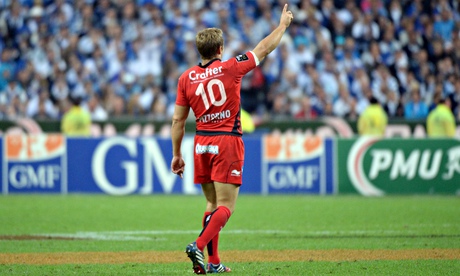
When the whistle went, Jonny Wilkinson was, for a brief moment, all alone. He was covering at full-back when the ball went into touch for the final time. He raised one hand in the air in celebration. And then he was swamped, buried beneath the bodies of his jubilant teammates. He scored 15 of Toulon’s points in their 18-10 victory over Castres. Three of them came from a drop goal, the rest were penalties, kicked from that familiar old pose, hands pressed together as if resting in prayer on the back of a pew, backside out, knees bent. It will never be seen again. He finishes as a champion of France, and of Europe, a fitting end to a fantastic career.
It was then that something really remarkable happened. God Save the Queen started to play over the public address system in the Stade de France.
Wilkinson said after Toulon won the Heineken Cup last Saturday that he felt he had been “oversupported”, and “given way too much respect”, comments he repeated when talking to the French press this week. And that was before the team had unveiled their special match-day jerseys, with “Merci Jonny” stitched into the collars. Before, a group of fans had announced that they intend to erect a statue of him to outside the Stade Félix Mayol. Before, tens of thousands of Frenchmen and women stood and sang the English national anthem in tribute to him.
Wilkinson has never sought such acclaim; in fact he has shied away from it.
At times, as in the 2003 World Cup, when he took to walking around in dark glasses with his cap pulled down and his collar tugged up, it was altogether too much for him to take. Fame, thanks and glory have never seemed to motivate him; rather, he has been driven by the pursuit of victory, the esteem of his team-mates and, more than anything else, his own desire to improve. He has been his own harshest critic.
Wilkinson has found it hard enough to deal with his own expectations of himself, little wonder he is reluctant to confront everyone else’s. This is a man, after all, who says that he likes to think that he is tracked by a camera, 24 hours a day, seven days a week, and that each night he watches back the imaginary footage and asks himself whether he is proud of what he sees in it. Even he will struggle to quibble with this day’s work.
They say genius lies in the infinite capacity for taking pains and, if that is so, then Wilkinson is one of the very few sportsmen who deserves the label that we have debased by applying so freely to so many. He ran through his repertoire a final time, showing off the skills he has been honing all his adult life. There was that fine flat pass to Mathieu Bastareaud, thrown with a flick of the wrists, so quick it cannot have filled more than a few frames of film, and a high, hanging loop to the same player a little later on, over the head of a defender. In between, there was a running jump to take a high ball, a flying tackle, as he shot out of the line to cut down Antonie Claassen as he broke off the back of a scrum, and a side-step around Rory Kockott, a trick Wilkinson resolved to learn after he saw how well it worked for Jason Robinson.
Also, a couple of cute chips, one just over Castres’ line, and another a little longer, into the open space he had on the right wing. There were the penalty kicks, of course, two from out on the right, one from straight in front, all from a range of around 40 yards, another, further still, from out on the touchline. And the drop, delivered from Castres’ 22 and struck sweet and true.
Wilkinson has said that his obsession with practising these things made his life hell. His perfectionism pushed him into spending four hours each day alone doing nothing but practising his goal-kicking, he did such a volume of work that he “wore through both sides of my groin, wrecked my back and tore muscles up and down my legs”. It became a disease. In 2005 and 2006, when his injury problems were at their worst, Wilkinson grew so infuriated with his imperfections that he started to punish himself physically for his mistakes. He would stamp on his left foot when he made a wayward kick, bite his hand till he drew blood when he fumbled a pass.
So Wilkinson has had to learn to live with himself, to forgive himself.
Living in the south of France, with the sun on his back, has helped. His insatiable curiosity – Clive Woodward once described him as “a sponge for new information” – has led him to find solace and wisdom in unusual places.
He has adopted Kaizen, a Japanese corporate philosophy that makes the relentless pursuit of perfection possible by breaking it down into incremental improvements. That allowed him to set himself limits he had lacked before. “My target for tomorrow,” he wrote recently, “is just to be better than I was today.” This Sunday, 15 years, eight months, and 10 days after he made his debut for Newcastle, he can finally rest easy.
Top 14 final coverage in association with TV5MONDE, the international French-language TV channel on Sky 799 and Virgin 825. UK viewers can see subtitled films, drama, documentaries, news and sport, including live Top 14 Rugby, cuisine and travel. More at tv5monde.co.uk

